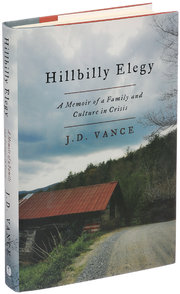Hillbilly Elegy
J.D. Vance
https://static01.nyt.com/images/2016/08/11/arts/11BOOKVANCE/11BOOKVANCE-master180.jpg

"The J.D. Vance interview really hit a nerve. Over the weekend, so many people tried to read it that the site crashed for a while. It has become by far the most-read piece ever on TAC. If you liked the interview, then by all means buy Hillbilly Elegy, Vance’s book.
The most fascinating correspondence I’m getting from the piece is from liberals who loved it. Here’s an excerpt from a letter I received from an academic whose roots are in Appalachia, and whose professional work is on Appalachian topics. I’ve edited it slightly to protect her privacy:
I do think the way I grew up is why I feel the way I do. My grandparents, who stayed in [Appalachia], worked incredibly hard every day of their lives, but they were poor until the day they died. This is why I get so angry when I hear some conservatives (not all!) suggest that the poor are lazy or, as Trump would say, “losers.” They worked harder than anybody I’ve ever known, but there’s not a lot of money to be made in [their business] — and that’s all that was available for work in that part of [Appalachia] at that time. That’s why I just can’t deal with Trump and the Republicans who endorse a secular version of the prosperity gospel. Hard work is no guarantee of success; sometimes the deck is stacked against you. That is one of the things I really appreciated about Vance’s argument–he acknowledged that while also still recognizing the importance of hard work and the possibilities of individual agency.
The left drives me nuts in some ways, too. Some of the people I work with would look down their noses at my grandparents because they only had eighth grade educations–they’d write them off as “stupid hillbillies.” There is nothing that makes me angrier. They may not have had the opportunities to be highly educated, but they were intelligent. That is true of so many people all over the world. The refusal to talk about individual agency also bothers me greatly, and then of course there’s the bigotry. I cannot tell you how many times I heard, “Must have been a short dissertation!” when I first got my job here and told people that my dissertation focused on [a topic having to do with intelligence in Appalachia]. Now I hear “I guess it’s a short book!” about [my recent book on the same topic]. My colleagues who also do this research feel the same way I do–we all want to punch these people.
I spend most of my time feeling out of place culturally. I’m so sick of being told by some on the Right that I’m a man-hater, that I’m responsible for the destruction of our country, that I indoctrinate our youth, that I’m godless and immoral, etc. I’ve been married to my college sweetheart for over 20 years. I love my daughter and son more than anything in the world. I go to church regularly. I’ve never smoked, done drugs, or been drunk in my life. But I’m also sick of some on the Left who act like I’m an idiot because I believe in God and that evil exists. I get tired of those who pretend that people’s bad lives are always a result of victimization. Yes. maybe they were victimized by “the system,” but their own bad choices played a role, too. No woman should ever be raped, but good lord, I want to shake some of these girls (and guys) and say, “Quit drinking until you’re unconscious!” Sure, in an ideal world you should be able to do whatever you want without having to worry about your safety, but would you rather be “right” or would you rather not be more vulnerable to rape? It’s insanity to me that we (feminists) are silent on the really unhealthy drinking that leaves so many young women easy prey for these sexual predators.
Would you believe that two other liberal correspondents who wrote to praise Vance are black and gay — one of them is an immigrant — and both identified Vance’s discussion about moral agency among the poor as critically important? They both grew up poor, and said this is a factor that does not get discussed.
I love the way J.D. Vance has opened up a space for more honest dialogue about poverty and dysfunction in America. If you think his book is all about blaming the poor people from which he came for all their own problems, you’re simply wrong. But he doesn’t sugarcoat or sentimentalize their lives either. He’s quite explicit in the book that if it hadn’t been for his tough old hillbilly grandmother, who finally took custody of teenage J.D. from his drug-addict mother, and the US Marine Corps, he almost certainly would have been another casualty of his culture. To be specific, he almost certainly would have been a casualty of the behavior of the adults in his culture."



